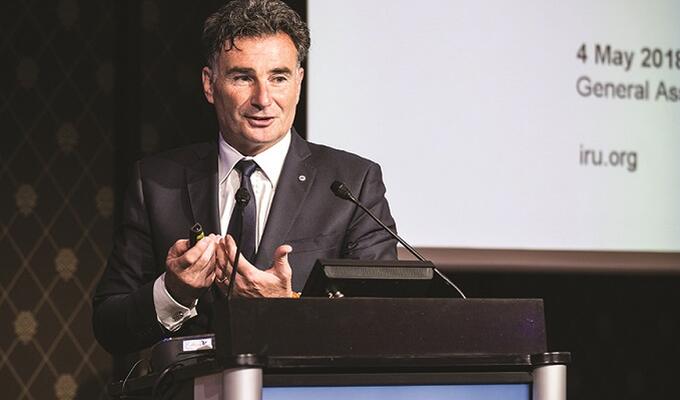

How technology is helping the transport sector become more sustainable
Technology is making border crossings faster, more secure and more efficient, reducing transport costs and boosting trade
The road transport industry is an essential element of the modern supply chain. It links production, distribution and consumption across geographies to provide door-to-door services and connects all supply chain stakeholders at the local, national, regional and global levels.
Road transport also plays a crucial role in developing countries and regions that lack alternative transport systems, such as railway infrastructure or inland waterways. In this context, it is often the only available mode for landlocked developing countries to access regional and global markets and participate in cross-border trade.
Cost-effective and high-quality transport systems are therefore indispensable to the fortunes of any economy. However, in most of the developing world, where the fluidity of cargo and people is almost entirely dependent on road transport, poor logistics performance often hinders economic and social development.
Improvements to road transport services in these contexts could have immediate beneficial impact. The social contribution of the road transport industry – which largely comprises micro, small and medium-sized enterprises (MSMEs) – is also relevant in terms of employment, living conditions and social welfare. The creation of new markets and trade corridors can significantly benefit the communities along the routes.
With global mobility a key factor in realizing the United Nations 2030 Agenda for Sustainable Development, the International Road Transport Union (IRU) was actively involved in the drafting of the Global Mobility Report, which includes vital contributions made to chapters on efficiency and universal access.
Highlighting the relationship between cross-border connectivity and economic prosperity, IRU put the spotlight on trade and transport facilitation through the implementation of tried and tested United Nations conventions.
The next steps are to focus on transport performance measurements. These include efforts to incorporate tangible services and tools such as TIR (the global customs transit system) and e-CMR (electronic consignment notes) as sustainability implementation indicators.
As road transport becomes increasingly digitized, connected and automated, new technology, business models, legal frameworks and investment strategies – together with changing trade patterns, market needs and environmental expectations – are transforming the landscape.
While 2019 marks the 70th anniversary of TIR, it is a 21st century digital tool. The system is fully intermodal. It makes border crossings faster, more secure and more efficient, reducing transport costs and boosting trade. Importantly, with the recent accessions of China, India and Pakistan it is now poised to serve a further 40% of the world’s population and to connect some of the world’s largest economies.
Together with the electronic consignment note, these digital systems will increase transparency, accuracy and the speed of business processes. In Europe, today it is unfortunately not uncommon for payments to be delayed by days and sometimes weeks because transport operators need to show signed CMR papers. In a business that depends on profit margins in low single digits, cash flow is often an issue for daily survival.
Equally, from the ground up, there is momentum to realize the benefits of better transport services. The stories that emerged from our 70th anniversary campaign – #WeLoveTheRoad – showed just how intimately transport impacts economies and communities.
IRU is driving this wide-scale expansion of trade corridors through our services, advocacy, certification and advisory work. The promotion of innovation, new technologies, better connectivity, professionalism and harmonization is at the fore of our endeavours together with our partners across the globe.
While Europe and Eurasia make clear steps towards the adoption of digital transport documents, these regions can learn from the practical experiences of Brazil and Mexico. In both countries transport consignment notes have been electronic for several years, providing increased transparency between stakeholders and simplifying compliance with regulatory processes.
Looking at the road transport system in the United States of America, the main digitalization effort in the past few years has been the introduction of electronic logging devices (ELDs). From 18 December 2017, ELDs have been mandatory on all trucks operating in the United States. This introduction was preceded by discussions on topics such as how ELD data will be used by the authorities and how data security will be ensured. While different in its implementation from European digital tachographs, which have been in place for many years, both solutions share the same purpose of recording driver time and occupation.
We are also very pleased to count the intelligent logistics information platform Yunmanman (YMM) within the IRU membership. YMM is the first domestic cargo transport dispatch platform in China to fully use the latest technologies in cloud computing, big data and mobile internet. It has more than 3.9 million registered heavy truck drivers and more than 850,000 registered cargo owners. The efficiency benefits of managing such vast numbers of transport stakeholders are staggering. Taking one example, the average time for finding cargo was reduced from 2.27 days to 0.38 days.
Great digitalization examples can also be found in different parts of Africa, where freight exchange platforms are booming and the M-Pesa phone-based banking and payment system is used to pay for goods deliveries.
But while innovation is clearly a powerful driver, it is not a panacea. Tackling inefficiencies in road transport services requires frameworks to improve productivity, safety, competition, sustainability, transparency and overall professionalism. Innovation has a part to play – but it is not the whole solution.
Professionalism needs to be driven by an enabling regulatory environment generating fair competition and quality of service. Access to the profession should be evaluated by qualitative criteria, so licenses and rules should be framed around the quality of service rather than the quantity of – for example – trucks or loading bays. This can only be achieved where there is consistent enforcement and transparency. If not, the playing field is no longer level.
In the context of emerging economies, IRU strongly supports efforts to review the regulatory environment at the regional level. The move towards a quality-based, multilateral regulatory framework for road transport is very positive. With trade so reliant on road transport, increased efficiency will yield untold economic growth. This is particularly pertinent for MSMEs operating in sometimes remote, underdeveloped regions with little transport infrastructure. The use of new technology and innovation to drive these efficiencies offers a way forward to long-term sustainable development.



